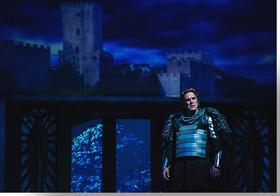Theater Review: Il trovatore
In 1849, as Giuseppe Verdi’s popularity began to soar, he read a translation—by his lover (who later became his second wife), the noted soprano, Giuseppina Strepponi—of the popular play El trovador (1836) by Antonio García Gutiérrez. The story is described as “a high flown, sprawling melodrama flamboyantly defiant of the Aristotelian unities, packed with all manner of fantastic and bizarre incident,” by Verdi scholar Julian Budden.
With offers for other works flying fast and furious at him, Verdi proceeded on Il trovatore with libretist Salvadore Cammarano, without a specific commission in hand, urging him to be “bold … the more unusual the better.” The libretto was honed via much back and forth letter writing between the two, with give and take on both sides, until Cammarano’s death in 1852. This was a great personal and professional blow to Verdi, but he forged ahead with a young and promising librettist, Leone Emanuele Bardare, who modified the previous draft (which had been completed into the third of four acts), according to Verdi’s instructions on expanding the role of Leonora, to make it “a two-woman opera,” as well as modifications in one of Azucena’s arias and some of the Count’s lines.
Full review at Colorado Drama

9(MDA3NDU1Nzc2MDEzMDUxMzY3MzAwNWEzYQ004))
Become a Member
Join the growing family of people who believe that music is essential to our community. Your donation supports the work we do, the programs you count on, and the events you enjoy.
Download the App
Download KUVO's FREE app today! The KUVO Public Radio App allows you to take KUVO's music and news with you anywhere, anytime!